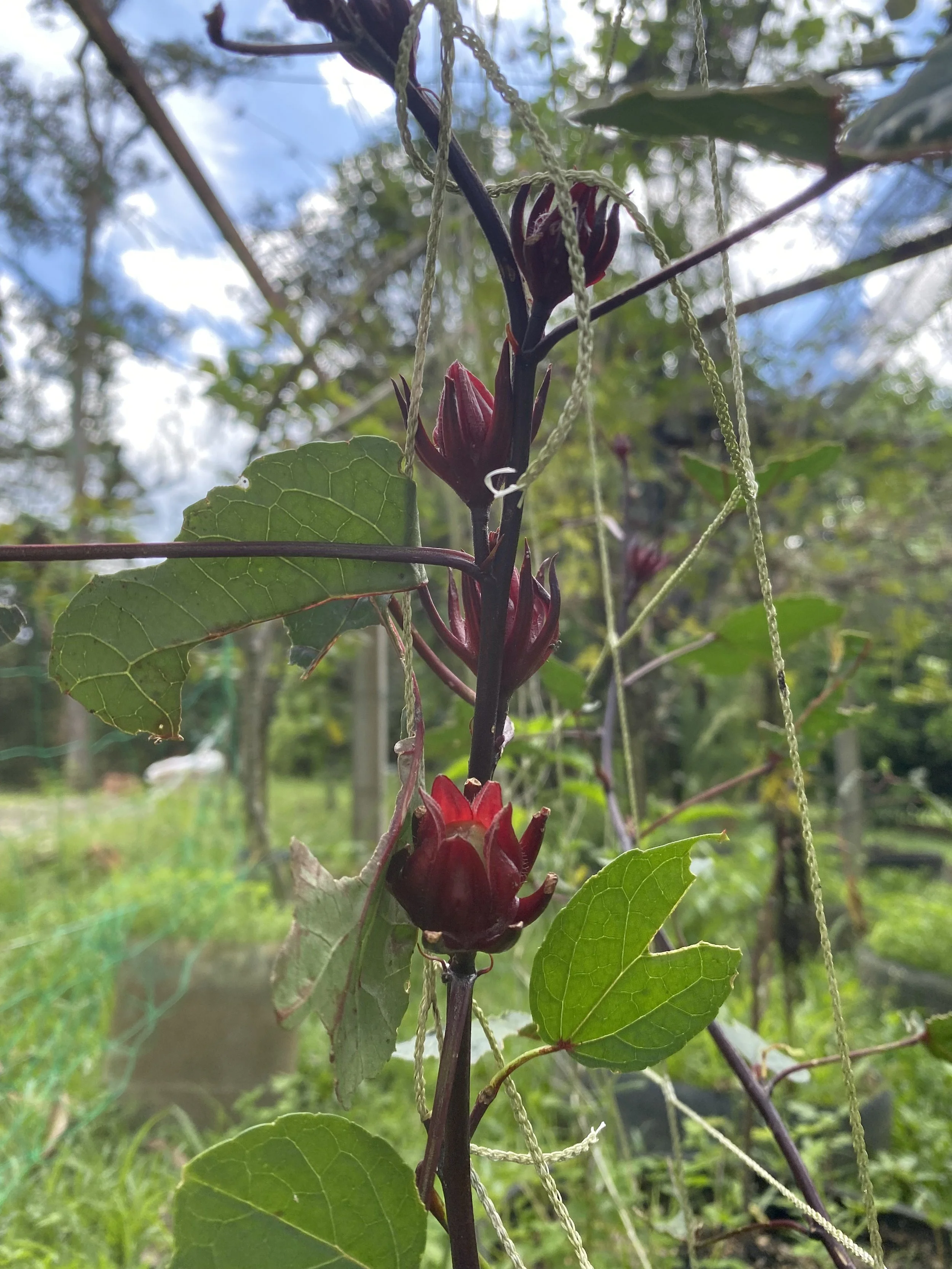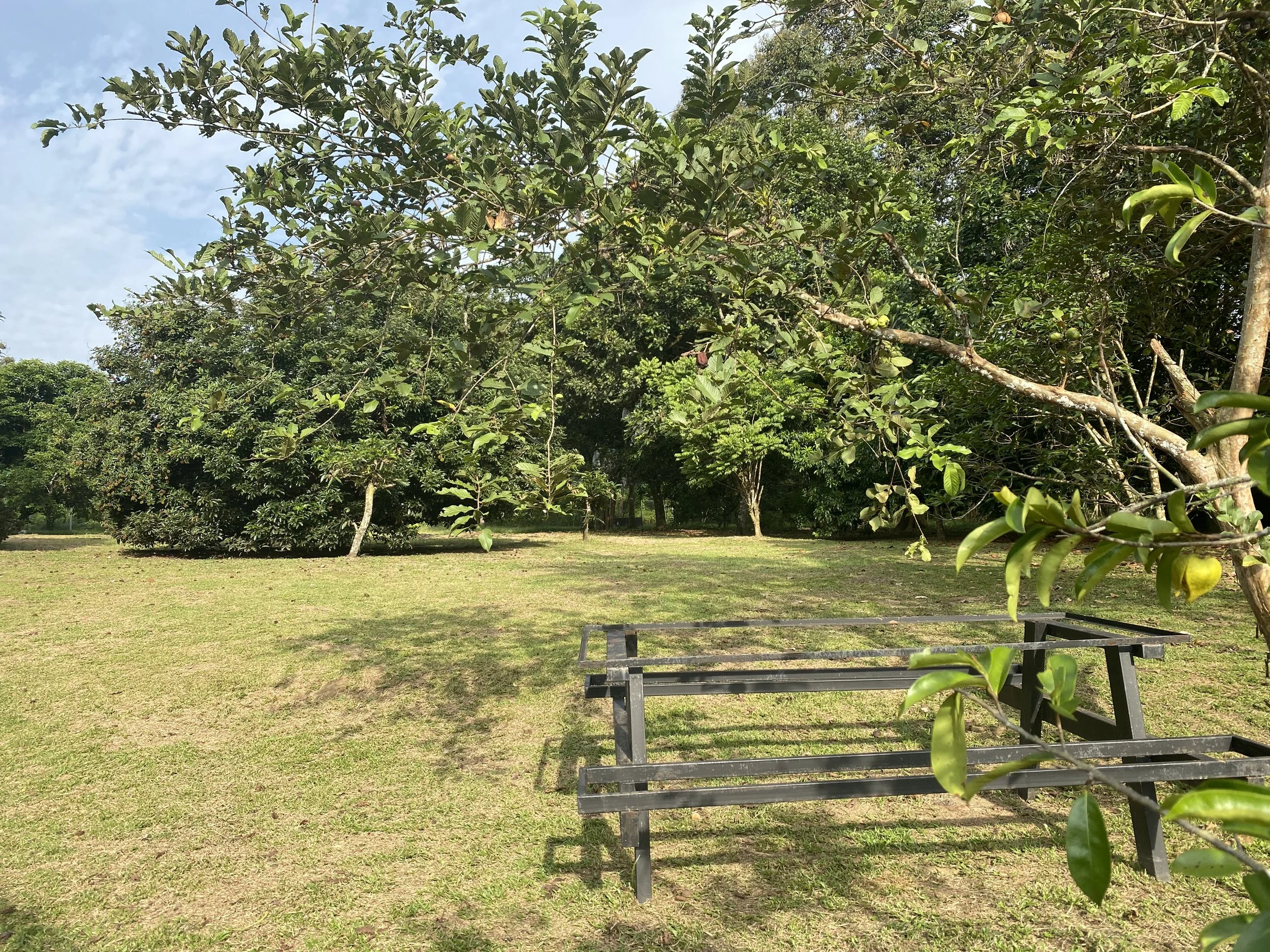Embedding Permaculture Practices at Ekar Lui Farm
“Permaculture is the harmonious integration of landscape and people providing their food, energy, shelter and other material and non-material needs in a sustainable way.” Bill Mollison (1988)
We acquired Ekar Lui farm about 10 years ago. The farm was not in its best condition as there was no caretaker to look after the plants around the farm. The grown trees could not bear healthy produce and we have to engage a dedicated helper to look after the farm. As it was an open space, we also have ‘uninvited visitors’ that naturally damaged our newly planted trees for their food. These visitors have limited safe habitat zone as more new farm (and homes) being developed around Sg Lui.
In our early years, we spend a lot of time to rehabilitate the farm despite our limited planting knowledge. We started to plant more trees at the farm and heavily dependent on commercial fertilisers to rejuvenate the plants and trees. Maintaining the farm is indeed costly.
Slowly we realised that we need to properly plan our farm management and operation. Our founder, Teacher Zalina, looked at various farm resources and agriculture practices to understand our challenges and find a long term solution. The onset of covid-19 made it even more urgent and purposeful for us to find a sustainable solution for our farm.
Coincidently, our daughter Aliya just graduated with an environmental science degree and introduced us to permaculture concept. Teacher Zalina, then enrolled in a permaculture design program from Permaculture Education (https://permacultureeducation.org). The program helped her to understand a more holistic view of sustainable living and not just about planting knowledge.
Later, the farm house plan was also being developed with the permaculture concept in mind. The architect-in-charge (HXN Architect) included the permaculture zoning plan into the farm house design proposal. Teacher Zalina then prepared and submitted Ekar Lui Farm concept in line with the zoning plan for her final assignment for the Permaculture Design certificate by end 2022.
Pic: The aerial view of Ekar Lui Farm.
We admit that the implementation of permaculture practices at our farm is a long journey as we believe in phasing out each steps with attainable targets. Setting our priorities based on our capability and limited resources is important for us.
Our challenges:
Inclusion: Ekar Lui working team need to share the same belief on sustainable living. Touching their heart-and-mind to embrace permaculture is no small feat. Understandably, people will feel more secure and safe in practicing things that they are familiar.
Education: implementing permaculture requires continuous learning for all of us. To go beyond our comfort zone i.e. learn & relearn from our farm space, with continuous observation of what we have and what we want to attain. This requires tremendous patience and perseverance.
Pushing our agenda forward: we also faced the new challenge for other people to understand our sustainability agenda. As an example, the farm house contractor was not a `green practitioner’ (green agenda is a new concept to them) i.e. discipline in proper waste management and open burning issues etc.
Social enterprise (SE): when we decided to open up Ekar Lui, we have carefully selected SE as our farm positioning. The culmination of Ekar Lui Farm School concept vis-a-vis Ekar Lui Farm is subsequently being developed to include our aspiration to open up our farm for public lessons in planting and permaculture practices.
Financial resource: we make do with our limited financial resource to pursue the sustainability agenda. Thus, we managed a tight budget for our farm. Operating as a social enterprise (SE Basic), the public expectation need to be managed for our Ekar Lui Farm School delivery. Reasonable fees need to be charged for our learning program.
Despite the challenges and many odds that we faced, we continue to pursue our permaculture journey for Ekar Lui.
Permaculture Practices at Ekar Lui:
Permaculture Design Plan: We started by observing our farm space and list down what we want for our farm i.e.
farm house concept - house design (people with special needs, child-friendly), house materials (IBS brick), energy efficiency (LED lightings, solar option, raised roof for better air flow) etc
the learning space - learn & play area, edible garden, reading room, camping ground
inclusion consideration: people with special needs, children with autism/ADHD, family with small children or elderly parents
waste management: compost point & recycling plan
water source: consumable water from natural hill, rain water harvesting for our plants, natural water for swimming pools
our trees & plants: how do we take care of existing trees and plan for future trees and planting
grey water treatment option
food source: edible garden, fish pond, livestock
Permaculture Ethics & Principles: we know that it would be overwhelming for beginners like us to fully adopt the prescribed ethics and principles in an instant. However, we believe in slow meaningful steps and do not rush through in our implementation.
Ethics: Earth Care, People Care & Fair Share - we shall share with you on how we embrace the permaculture ethics in our small way in next posting.
Principles: Observe & Interact, Catch & Store Energy, Obtain A Yield, Apply Self Regulation & Accept Feedback, Use & Value Renewable Resources & Services, Produce No Waste, Design from Patterns to Details, Integrate Rather Than Segregate, Use Small & Slow Solutions, Use & Value Diversity, Use Edges & Value Marginal, Creatively Use & Respond to Change - we honestly admitted that we slowly embed the principles in our daily practices. This a journey and not a competition `to finish first’. Don’t shy away to learn from other permaculture experts and practitioners.
Observation: the discipline to observe our space is key in permaculture. We not only observed our farm when we first designed the permaculture plan, but we continue to observe our farm space and those around it, over time. This help us to further understand what we have done well and also our lesson learnt. The observation and acquired knowledge helped us to review and enhance our permaculture practices at the farm.
Mindset and behaviour change: the shift in our belief that we are not the farm owner but instead, the farm caretaker. This impact the way we think of the farm, from `an asset that we own’ to a responsible caretaker of the farm. It gives us a clear direction on what we need to do for Ekar Lui as a sustainable space.
Permaculture Application: We started off with simple practices:
Embarked on composting to move away from our dependency on commercial (organic) fertilisers. We have started to build our compost bin to use farm waste and kitchen waste as a safe option for our plants.
Rain harvesting: simple way to get water source for our plants.
Fish pond: we breed fishes in our small pond as food source and have enjoyed this experience tremendously.
Seed saving: we do not throw our fruits/plant seeds and use it to plant more now. We experienced success and failures but the learning helped us to improve in our seed saving effort.
A Journey and Not An End: We put many practical ‘lamp posts’ along our permaculture journey, with do-able targets. Most importantly, it is about meeting the needs of our key stakeholders - our family, neighbours and students of Ekar Lui Farm School. Just do it at your own pace if you want to adopt permaculture practices.
Our journey and experience thus far, have been meaningful. We hope to improve more by learning from others. In this context, we are grateful that our daughter, Aliya and son-in-law, Imran are permaculture practitioners at A Little Wild, Kota Tinggi. They are our point of reference.
We also learned from other experienced permaculture leaders like Bapak Iskandar, Tuan Krishna and Ibu Dar from Bumi Langat Institute, Yogyakarta Indonesia, and Temuku Farmstead & Organic Farm in Bali. We met them in recent programs in Johor and Singapore.
Pic: Early days at Ekar Lui Farm.
We hope that you have learned a bit from our story. Have a great week ahead.
Ekar Lui Farm
Sungai Lui, Hulu Langat.



